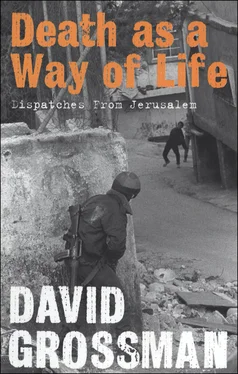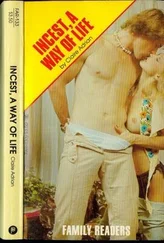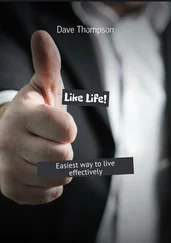David Grossman - Death as a Way of Life
Здесь есть возможность читать онлайн «David Grossman - Death as a Way of Life» весь текст электронной книги совершенно бесплатно (целиком полную версию без сокращений). В некоторых случаях можно слушать аудио, скачать через торрент в формате fb2 и присутствует краткое содержание. Год выпуска: 2013, Издательство: Bloomsbury Publishing, Жанр: Прочая документальная литература, на английском языке. Описание произведения, (предисловие) а так же отзывы посетителей доступны на портале библиотеки ЛибКат.
- Название:Death as a Way of Life
- Автор:
- Издательство:Bloomsbury Publishing
- Жанр:
- Год:2013
- ISBN:нет данных
- Рейтинг книги:5 / 5. Голосов: 1
-
Избранное:Добавить в избранное
- Отзывы:
-
Ваша оценка:
- 100
- 1
- 2
- 3
- 4
- 5
Death as a Way of Life: краткое содержание, описание и аннотация
Предлагаем к чтению аннотацию, описание, краткое содержание или предисловие (зависит от того, что написал сам автор книги «Death as a Way of Life»). Если вы не нашли необходимую информацию о книге — напишите в комментариях, мы постараемся отыскать её.
Death as a Way of Life — читать онлайн бесплатно полную книгу (весь текст) целиком
Ниже представлен текст книги, разбитый по страницам. Система сохранения места последней прочитанной страницы, позволяет с удобством читать онлайн бесплатно книгу «Death as a Way of Life», без необходимости каждый раз заново искать на чём Вы остановились. Поставьте закладку, и сможете в любой момент перейти на страницу, на которой закончили чтение.
Интервал:
Закладка:
It’s almost midnight. When I write a story, I try to go to sleep with one unfinished idea, an idea I haven’t gotten to the bottom of. The hope is that at night, in my dreams, it will ripen. It is so exhilarating and rejuvenating to have a story help extricate me from the dispassion that life in this disaster zone dooms me to. It’s so good to feel alive again.
Monday
I keep reading hostile remarks about Israel in the European press, even accusations that Israel is responsible for the world’s current plight. It infuriates me to see how eagerly some people use Israel as a scapegoat. As if Israel is the one, simple, almost exclusive reason that justifies the terrorism and hate now targeted against the West. It’s also astounding that Israel was not invited to participate in the anti-terrorism coalition, while Syria and Iran (Syria and Iran!) were.
I feel that these and other events (the Durban conference and its treatment of Israel; anti-Israeli Islamic incitement and racism) are causing a profound realignment in Israelis’ perceptions of themselves. Most Israelis believed that they’d somehow broken free of the tragedy of Jewish fate. Now they feel that that tragedy is once again encompassing them. They’re suddenly aware of how far they still are from the promised land, how widespread stereotypical attitudes about “the Jew” still are, and how common antisemitism is, hiding all too often behind a screen of (supposedly legitimate) extremist anti-Israel sentiments.
I’m highly critical of Israel’s behavior, but in recent weeks I’ve felt that the media’s hostility to it has not been fed solely by the actions of the Sharon government. A person feels such things deeply, under the skin. I feel them with a kind of shiver that runs back to my most primeval memories, to the times when the Jew was not perceived as a human being of flesh and blood but was rather always a symbol of the Other. A parable, or a chilling metaphor. Last night I heard the host of a BBC program end his interview with an Arab spokesman with the following remark (I’m quoting from memory): “So you say that Israel is the cause of all the troubles that are poisoning the world today. Thank you, and I’d like to wish our audience good night.”
Tuesday
For two weeks already there has been a decline of sorts in the level of violence between Israel and the Palestinians. The heart, so accustomed to disappointments, still refuses to be tempted into optimism, but the calm allows me to get absorbed in writing without pangs of conscience. The woman in my story is becoming more of a presence. I haven’t the slightest idea where she is leading me. There’s something bitter and unbounded about her that frightens and attracts me. There’s always that great expectation at the beginning of every story — that the story will surprise me. More than that, I want it to actually betray me. To drag me by the hair, absolutely against my will, into the places that are most dangerous and most frightening for me. I want it to destabilize and dissolve all the comfortable defenses of my life. It must deconstruct me, my relations with my children, my wife, and my parents; with my country, with the society I live in, with my language.
It’s no wonder that it is so hard to get into a new story. My soul is on guard. Like every living thing, it seeks to continue in its movement, in its routine. Why should it take part in this process of self-destruction? What’s wrong with the way it is? Maybe that’s why it takes me a long time to write a novel. As if in the first months I have to remove layer after layer of cataract from my recalcitrant soul.
Wednesday
“The only one smiling is the one who hasn’t heard the latest news.” So wrote Bertolt Brecht. At 7:30 in the morning the radio reports the assassination of Israeli Minister of Tourism Rechavam Ze’evi. Ze’evi was an extremist who advocated transferring the Palestinians out of the West Bank and Gaza Strip. I never agreed with his beliefs, but such an act of terrorism is horrible and unjustified. That is also my opinion when Israel murders a Palestinian political figure.
Like every other country, Israel has the right to defend itself when a terrorist bearing a “ticking bomb” is on his way to attack. Rechavam Ze’evi, despite his views, was not a terrorist.
The heart fills with apprehension. Who knows how the situation will deteriorate now. Over the last two days there was relative calm, and we were almost bold enough to resume breathing with both lungs. Now, all at once, it’s as if the trap has closed in on us once again. I am reminded of how easily we can be overcome by the unbearable lightness of death (as I write, I have the feeling that I am documenting the last days before a great catastrophe).
Still, last night I had a small, private moment of comfort. As on every Tuesday, I studied with my hevruta. It’s two friends, a man and a woman, with whom I study Talmud, Bible, and also Kafka and Agnon. The hevruta is an ancient Jewish institution. It’s a way of studying together and sharpening the intellect through debate and disputation. During our years of study together, we have developed a kind of private language of associations and memories. I’m the nonreligious one of the three, but I’ve already had ten years of vibrant, exciting, and stormy dialogue with these soulmates. When we study, I become intimately connected to the millennia-long chain of Jewish thinkers and creators. I reach down into the foundations of the Hebrew language and Jewish thought. I suddenly understand the code hidden in the deep structure of Israel’s social and political behavior today. In the midst of confusion and the loss that surrounds me, I unexpectedly feel I belong.
Thursday
Things fall apart. Israeli forces are entering the Palestinian city of Ramallah. A day of combat. Six Palestinians are killed, a ten-year-old girl among them. Another of the victims was a senior official of Fatah, the majority Palestinian faction, who was responsible for the murder of several Israelis. An Israeli citizen was killed by Palestinian gunfire coming from the village of another, previously killed, Fatah operative. The fragile cease-fire is no more, and who knows how long it will take to rehabilitate it. I call one of the people I can share my gloom with at such a moment. Ahmed Harb, a Palestinian writer from Ramallah, a friend. He tells me about the shooting he hears. He also tells of the optimism that prevailed among the Palestinians until the day before yesterday, before Ze’evi’s murder. “Look how the extremists on both sides are working hand in hand,” he says. “And look how successful they are …” Only two days ago Israel lifted its siege of Ramallah for the first time in weeks. After Ze’evi’s assassination the roadblocks returned. I ask him if there’s something I can do to help him, and he laughs. “We just want to move. To be in motion. To leave the city and come back …”
Between the news bulletins, amid the ambulance sirens and the helicopters that relentlessly circle above, I try to isolate myself. I battle to write my story. Not as a way of turning my back on reality — reality is here, in any case, like acid that eats away any protective coating — but rather out of a sense that, in the current situation, the very act of writing becomes an act of protest. An act of self-definition within a situation that literally threatens to obliterate me. When I write, or imagine, or create even one new phrase, it is as if I have succeeded in overcoming, for a brief time, the arbitrariness and tyranny of circumstance. For a moment, I am not a victim.
Friday
The week is coming to an end. Its events were so acute that I did not have time to write about many important things dear to me: about my son, who is writing a surrealist play for his high school drama club; about the soccer game we watched together on television, Manchester United vs. Deportivo la Coruña (with Barthez’s outrageous blunders); about my daughter, who is conducting a scientific study of her parakeet; about my eldest son, who is serving in the army and about whom I am anxious each and every moment. Also, about our twenty-fifth wedding anniversary this week, celebrated this time with much concern: Will we succeed in preserving this vulnerable family structure in the years to come?
Читать дальшеИнтервал:
Закладка:
Похожие книги на «Death as a Way of Life»
Представляем Вашему вниманию похожие книги на «Death as a Way of Life» списком для выбора. Мы отобрали схожую по названию и смыслу литературу в надежде предоставить читателям больше вариантов отыскать новые, интересные, ещё непрочитанные произведения.
Обсуждение, отзывы о книге «Death as a Way of Life» и просто собственные мнения читателей. Оставьте ваши комментарии, напишите, что Вы думаете о произведении, его смысле или главных героях. Укажите что конкретно понравилось, а что нет, и почему Вы так считаете.












